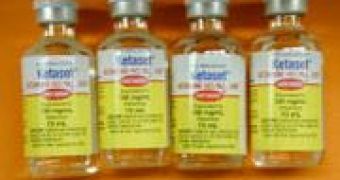Ketamine, or "Special K", is a veterinary anesthetic as well as a popular recreational drug due to its short term hallucinogenic effects. Now a study conducted by Dr Carlos Zarate Jr., a psychopharmacologist at the National Institute of Mental Health in Bethesda, Maryland, and colleagues has shown that the drug also works as an anti-depressant.
A single dose of ketamine improved the mood of patients with major depression in as little as 2 hours, effectively reversing the depression, with effects lasting up to a week.
For half a century, depression treatments have largely targeted a class of neurotransmitters called monoamines. Recent drugs such as Prozac and Paxil, for example, work by blocking serotonin uptake, making more of the neurotransmitter available to stimulate neurons typically understimulated in depressed people. The monoamines are limited to particular tasks within the brain, however. A more general communication system relies on an amino acid called glutamate which is associated with learning and memory, but it's also implicated in mood regulation.
Carlos Zarate and his colleagues targeted a key player in the glutamate system, a receptor known as N-methyl d-aspartate (NMDA). Seventeen patients, who had major depression and had not responded to traditional antidepressants, were injected with either a placebo or ketamine, a known NMDA receptor blocker.
The team reported in this month's issue of Archives of General Psychiatry that 12 patients responded to the treatment, with 5 of them meeting the criteria for remission of depression. In addition, 6 patients experienced relief for at least a week from the single injection. A placebo offered to the same group, on a different day, helped much less.
NIMH director, Dr Thomas Insel, has underlined the importance of these findings: "This is the first report of any medication or other treatment that results in such a pronounced, rapid, prolonged response."
The speed with which the treatment works is indeed remarkable when compared to the regular treatments of depression that usually need around 2 months before any improvement can be seen. This is important because major depression is associated with increased suicidal behavior which manifests itself particularly in the first 9 days of therapy.
This study adds significantly to the mounting body of evidence that the glutamate system is a more specific target for depression therapies, says John Krystal, a psychopharmacologist at Yale University, who conducted a study in 2000 hinting at ketamine's antidepressant effects. "We have needed to develop approaches that don't simply repeat treatment strategies already in place, ... and the glutamate story as it has emerged is very promising."

 14 DAY TRIAL //
14 DAY TRIAL //